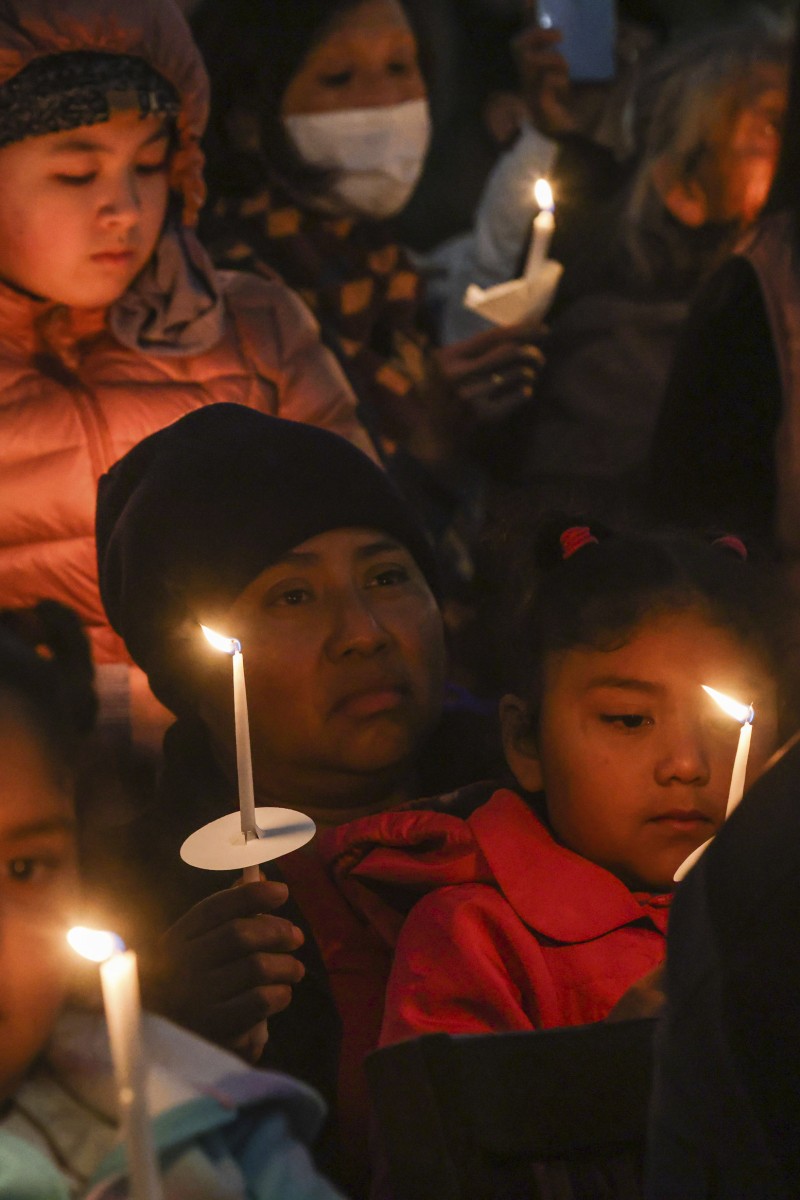
Your Voice: Stop gun violence in the US; How Hong Kong’s mask mandate has affected friendships (short letters)
- This week, one student writes about the recent mass shootings in California and the need for stronger gun laws in the United States
- Another teen talks about how wearing a mask can make it difficult to read a person’s emotions and harm interpersonal relationships
 People gather at a community vigil for the Half Moon Bay shootings in California. Photo: San Francisco Chronicle via AP
People gather at a community vigil for the Half Moon Bay shootings in California. Photo: San Francisco Chronicle via APHave something to say? Send us a letter using this Google form.
When will the shootings be stopped?
Lee Wang-lap, Po Leung Kuk Lo Kit Sing (1983) College
Looking at the memorial to the victims of the recent shooting in Half Moon Bay in California is heartbreaking. It is painful to learn that so many innocent people have been killed by guns across the US.
It is not clear what the shooters’ intentions were, but I believe prompt action should be taken to save more innocent people from losing their lives. Gun laws in the US have caused unimaginable suffering for so many.
As gun violence rages in the US, students from Asia express concern about studying in America
I have two cousins living in the US, and they are often terrified by the sound of a shotgun blast coming from near their home. Even though the Second Amendment allows for the use of firearms for hunting and self-defence, some people still choose to take innocent lives with them. Mass shootings across the US are often reported in the news.
If the government does not take action, more deranged people will continue these heinous acts. The primary cause behind mass shootings is the ease of access to firearms in the US – guns can be easily obtained in most states. I believe that all states should require a permit and a background check before someone is allowed to buy a gun.
People cannot feel secure in public spaces as long as others are allowed to possess firearms.
Eyes can’t tell the full story
Tam Hiu-kwan, St Paul’s Secondary School
The Covid-19 pandemic has been going on for three years, and its effects have been far-reaching, from the economy and politics to interpersonal relationships.
The mask mandate has had a negative effect on many aspects of life, including friendships, as it has become more difficult to read the emotions of others due to the lack of facial cues.
We cannot rely solely on the movements of the eyes to tell how someone is feeling. Just because someone has a smile in their eyes doesn’t mean that they are happy all the time. As a result, it is easy to misunderstand someone’s emotions. After talking to my classmates, many admitted that they had misunderstood their friends’ feelings, for instance, not realising their friends were angry.
To avoid this, it is important to pay attention to the behaviour and emotions of those around us. Open communication is often the best way to navigate a difficult situation. If you are feeling upset, it is important that you communicate your feelings to your friends.
It is important to show kindness not only to your friends but also to your other peers. Everyone is struggling in this pandemic, so try to lend a helping hand if you can.
Should Hong Kong scrap the mask mandate once and for all?
You are what you eat
Serene Chan Hei-tung, Leweston School (Britain)
“You are what you eat”, so they say. To what extent is this true?
This proverb has been a core belief in many cultures throughout history. The ancient Aztecs are believed to have devoured their rivals’ brains so that it would provide them with wisdom and knowledge about their foes. Many modern-day societies still hold strong views about the significance of what we eat and how it affects our health.
Do teenagers really need protein shakes? One nutritionist dispels the myths
Our diets determine the quality of the cells in our bodies, which ultimately affects every part of who we are. The composition of these cells is determined by what we eat, all the way down to the tiniest building block of the body. Every day, the average adult body replaces about 300 billion cells with the nutrients they absorb.
Meals become the fuel for the body’s manufacturing plan to replace cells that perish. In return, the nutrition we obtain from sustenance directly affects everything from our physical structure to our mental and emotional wellness. What you put in your body shapes how you appear, feel and perform.
Eating processed junk food will result in you feeling like processed junk. Our bodies are magnificent mechanisms that deserve high-quality nourishment.
How to keep a happy family
Owen Leung, CNEC Christian College
Parental arguments can turn a cheerful family into a depressed one, which can cause damaging consequences, even divorce.
These arguments can have negative effects on children’s mental health. Common reasons for parents to start arguing include disagreements about money and household chores. Sometimes, parents argue just because they are worn out. A quiet conversation between parents can become a deafening argument in just a few minutes.
Help! How do I get my parents to stop comparing me to other people?
According to UK research, children’s heart rates and stress hormone responses may be increased by exposure to conflict. Children can also show signs of disrupted early brain development, sleep disturbance, anxiety and other problems as a result of living with severe inter-parental conflict.
There are actions we can take to ease the problem. Starting a conversation about your day is one way to distract parents from arguing. You can talk to them individually to understand their situations. But ultimately, you are not responsible for your parents’ actions. Ask trusted adults for advice, such as your grandparents or school counsellors.
